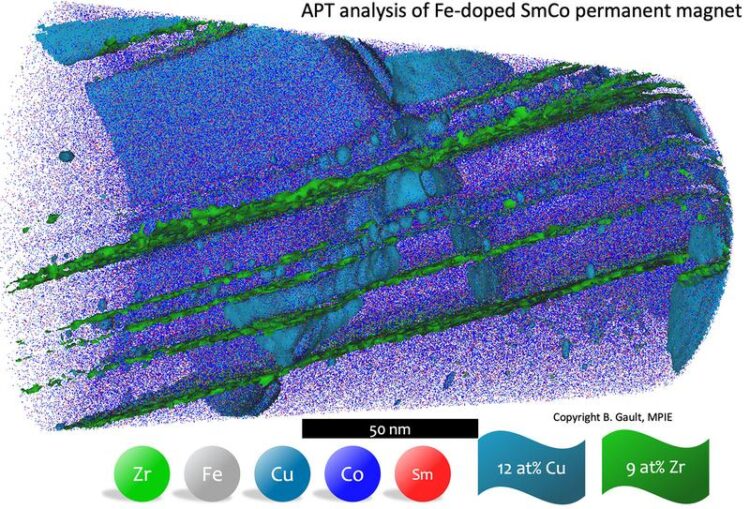Magnets: Key materials for green energy

Analysis of Fe-doped SmCo permanent magnet by atom probe tomography.
Baptiste Gault / Max-Planck-Institut für Eisenforschung GmbH
New collaboration between TU Darmstadt and MPIE
The Technical University Darmstadt and the Max-Planck-Institut für Eisenforschung (MPIE) started a new Max Planck Research Group headed by Prof. Oliver Gutfleisch, Professor of Functional Materials at the TU Darmstadt and scientific director at the Fraunhofer IWKS Materials Recycling and Resource Strategies. The group is established at the MPIE and deals with the design of advanced hard and soft magnets, magnetocaloric and related functional materials.
“Magnets are key materials for electrification thus providing sustainable mobility and energy applications. My expertise in designing magnets and the MPIE’s expertise in correlative electron microscopy and tomography down to the atomic scale make an ideal combination to push functional bulk magnets to their physical limits.“, explains Gutfleisch.
“I am very happy and proud that we could win Oliver for this group. Research on some of the biggest current challenges, such as sustainability, electrification, advanced manufacturing and artificial intelligence requires intense collaboration across several disciplines and institutions. MPIE is taking these challenges on and develops new collaboration schemes that reach beyond established departments, cooperation formats and disciplines for pushing the limits of basic material research”, states Prof. Dierk Raabe, managing director at the MPIE.
The new group “De Magnete – Designing Magnetism on the Atomic Scale” analyses the critical magnetization reversal processes on the atomic scale using advanced experimental and simulation methods. The aim is to capture, reproduce and predict transitional and dynamic processes that are relevant for nucleation and propagation during all critical magnetization reversal processes on all length scales. Magnets are used in many fields of daily life and industry like in energy conversion, electromobility, data storage and robotics. Their enhancement is key to a carbon neutral economy.
An already existing successful collaboration between Prof. Gutfleisch and the MPIE is the Collaborative Research Centre/Transregio 270 “Hysteresis design of magnetic materials for efficient energy conversion” which is funded by the German Research Foundation. Dr. Baptiste Gault, head of the MPIE group “Atom Probe Tomography”, Prof. Gutfleisch and experts of the University Duisburg-Essen and the Ernst-Ruska Centre for Microscopy and Spectroscopy with Electrons are working on adjusting the local and global properties of magnetic materials by additive manufacturing and severe plastic deformation methods.
Wissenschaftliche Ansprechpartner:
Prof. Dierk Raabe, raabe@mpie.de
Weitere Informationen:
Media Contact
All latest news from the category: Power and Electrical Engineering
This topic covers issues related to energy generation, conversion, transportation and consumption and how the industry is addressing the challenge of energy efficiency in general.
innovations-report provides in-depth and informative reports and articles on subjects ranging from wind energy, fuel cell technology, solar energy, geothermal energy, petroleum, gas, nuclear engineering, alternative energy and energy efficiency to fusion, hydrogen and superconductor technologies.
Newest articles

Parallel Paths: Understanding Malaria Resistance in Chimpanzees and Humans
The closest relatives of humans adapt genetically to habitats and infections Survival of the Fittest: Genetic Adaptations Uncovered in Chimpanzees Görlitz, 10.01.2025. Chimpanzees have genetic adaptations that help them survive…

You are What You Eat—Stanford Study Links Fiber to Anti-Cancer Gene Modulation
The Fiber Gap: A Growing Concern in American Diets Fiber is well known to be an important part of a healthy diet, yet less than 10% of Americans eat the minimum recommended…

Trust Your Gut—RNA-Protein Discovery for Better Immunity
HIRI researchers uncover control mechanisms of polysaccharide utilization in Bacteroides thetaiotaomicron. Researchers at the Helmholtz Institute for RNA-based Infection Research (HIRI) and the Julius-Maximilians-Universität (JMU) in Würzburg have identified a…



